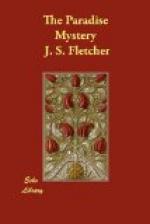“Something like that,” assented Bryce. “Naturally no man wishes to marry unless he knows as much as he can get to know about the woman he wants, her family, her antecedents—and all that. Now, pretty nearly everybody in Wrychester who knows them, knows that there’s a mystery about Dr. Ransford and his two wards—it’s been talked of, no end, amongst the old dowagers and gossips of the Close, particularly—you know what they are! Miss Bewery herself, and her brother, young Dick, in a lesser degree, know there’s a mystery. And if there’s one man in the world who knows the secret, it’s Ransford. And, up to now, Ransford won’t tell—he won’t even tell Miss Bewery. I know that she’s asked him—he keeps up an obstinate silence. And so—I determined to find things out for myself.”
“Aye—and when did you start on that little game, now, doctor?” asked Mitchington. “Was it before, or since, this affair developed?”
“In a really serious way—since,” replied Bryce. “What happened on the day of Braden’s death made me go thoroughly into the whole matter. Now, what did happen? I’ll tell you frankly, now, Mitchington, that when we talked once before about this affair, I didn’t tell you all I might have told. I’d my reasons for reticence. But now I’ll give you full particulars of what happened that morning within my knowledge —pay attention, both of you, and you’ll see how one thing fits into another. That morning, about half-past nine, Ransford left his surgery and went across the Close. Not long after he’d gone, this man Braden came to the door, and asked me if Dr. Ransford was in? I said he wasn’t—he’d just gone out, and I showed the man in which direction. He said he’d once known a Dr. Ransford, and went away. A little later, I followed. Near the entrance of Paradise, I saw Ransford leaving the west porch of the Cathedral. He was undeniably in a state of agitation—pale, nervous. He didn’t see me. I went on and met Varner, who told me of the accident. I went with him to the foot of St. Wrytha’s Stair and found the man who had recently called at the surgery. He died just as I reached him. I sent for you. When you came, I went back to the surgery—I found Ransford there in a state of most unusual agitation—he looked like a man who has had a terrible shock. So much for these events. Put them together.”
Bryce paused awhile, as if marshalling his facts.
“Now, after that,” he continued presently, “I began to investigate matters myself—for my own satisfaction. And very soon I found out certain things—which I’ll summarize, briefly, because some of my facts are doubtless known to you already. First of all—the man who came here as John Braden was, in reality, one John Brake. He was at one time manager of a branch of a well-known London banking company. He appropriated money from them under apparently mysterious circumstances of which I, as yet, knew nothing; he was prosecuted, convicted, and sentenced to ten years’ penal servitude. And those two wards of Ransford’s, Mary and Richard Bewery, as they are called, are, in reality, Mary and Richard Brake—his children.”




